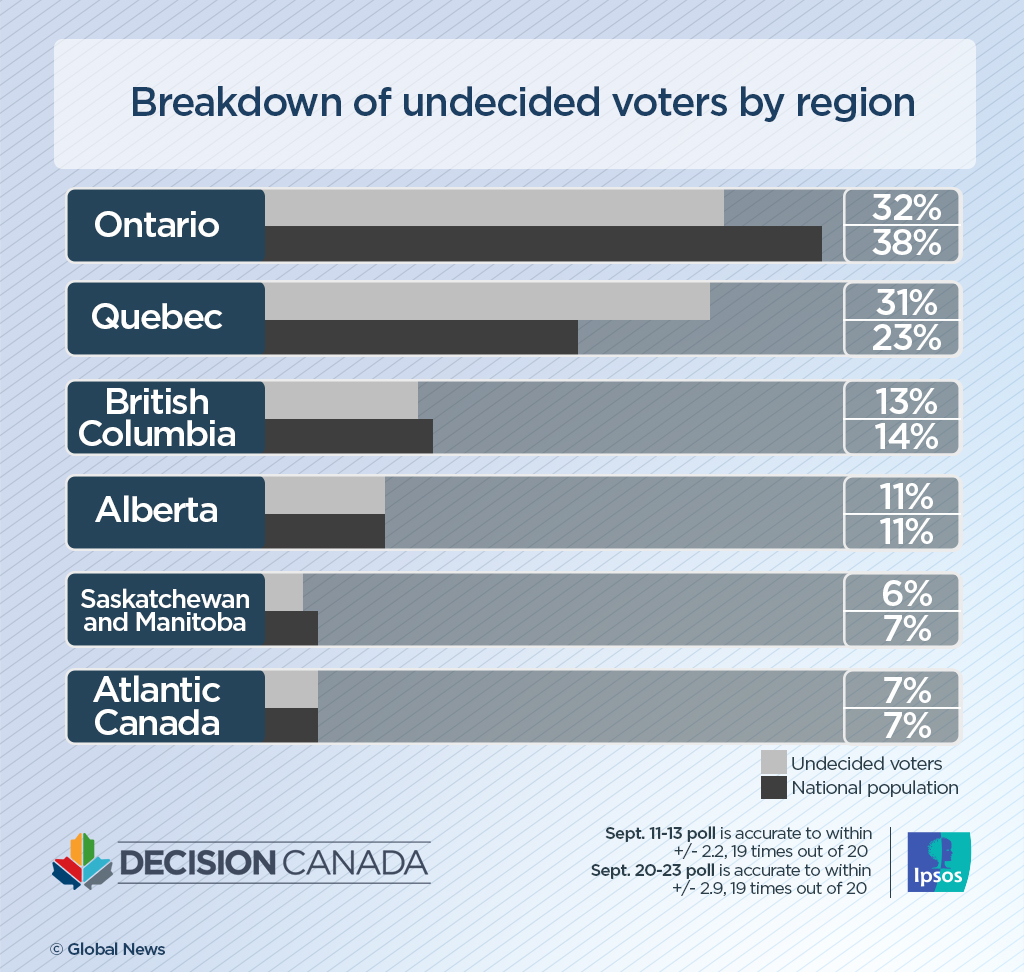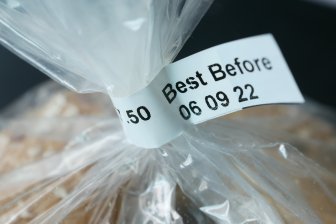Four years ago, Maple Ridge, B.C., resident Shirley Kavanagh knew which political party she would vote for in the federal election — but that’s not the case this time around.

Less than a month away from making her trip to the ballot box, Kavanagh is stumped.
“I just don’t feel there’s anyone good out there right now that actually knows what to do to make everything better for the country,” she said in an interview with Global News.
According to an Ipsos poll conducted exclusively for Global News, the 52-year-old isn’t alone in feeling this way.
If the 2019 election were called tomorrow, one in 10 eligible voters in Canada — or 11 per cent of Canadians — would have no clue who to vote for, according to the poll results.
That’s not uncommon a few weeks into a federal election campaign, said Howard Ramos, a political sociologist and professor at Dalhousie University. But given the “tight race” in 2019, courting every voter in Kavanagh’s position over the next three weeks is “very important,” he argued.
According to the Ipsos poll, 32 per cent of undecided voters are located in Ontario and 31 per cent live in Quebec.
Undecided voters vary in age, gender and education level, the poll results show, but one factor is consistent: they can clearly identify and even have strong opinions about the policy issues that are important to them, which include health care, the cost of living and taxes.
So why can’t they figure out which political party to support?
These voters aren’t happy with the status quo and don’t yet see a convincing alternative, said Darrell Bricker, CEO of Ipsos Public Affairs.
“The thing they really seem to be worried about is the economy, and this election is one that’s going to be driven by an agenda that’s mostly related to the economy, specifically affordability,” Bricker told Global News.
“They’re not happy with where the Liberals are on these issues, they haven’t heard enough from the Conservatives that would make them move over to the Conservatives so they’re open right now to hearing some different arguments.”
‘If you’ve got a good policy, tell us what it is’
Ed Arditti, a 74-year-old retired lawyer, living in Tecumseh, outside of Windsor, Ont., is one those undecided voters most worried about the economy — specifically, job security.
“That troubles me because I consider my children,” he told Global News. “What they’re going to do to make money — are they going to survive well?”
“I don’t see, right now, great economy being structured by our political leaders, and that, to me, is a big issue. Everything else is interesting, but it’s not what this country depends upon, as far as I’m concerned.”
Arditti called on leaders to be more forthcoming about their plans.
“If you’ve got a policy, tell us what it is.”
He added: “Let people decide whether you’re the person that we should give our ballot. And if you can’t do that, get out of the job.”

For her part, Kavanagh doesn’t think any of the parties’ platforms are “practical” from a fiscal point of view. The parties are offering “big ideas” without explaining in detail how they’re going to pay for those promises, she argued.
“They want to give everyone all this money … but where are they getting the money from?”
A higher percentage of undecided voters (62 per cent) are skeptical of the Trudeau Liberals’ record than the entire electorate (58 per cent), according to the Ipsos poll results.
Undecided voters favour Trudeau then May for PM
When it comes to which leader is the best choice for prime minister, undecided voters are just as uncertain about that.
Even though two out of three (66 per cent) said it’s time for another federal party to take over, 32 per cent favoured Trudeau as the leader who would make the best prime minister. Meanwhile, one in four (24 per cent) backed Elizabeth May, putting the Green party leader in second place, followed by Conservative Leader Andrew Scheer at 18 per cent.
Bricker said May’s standing didn’t surprise him, arguing that undecided voters are “looking for a strong leader on the other side” as they consider their options.
Kavanagh thinks May is perhaps the only strong leader in play — but the Green party’s platform is “too idealistic,” she said.
As for Scheer and NDP Leader Jagmeet Singh, Francine Gobeil, a 47-year-old resident of La Guadeloupe, Que., said she’s trying to pick between the two but doesn’t know enough about the new leaders to assess who would best serve the country.

Gobeil said she wants to study Scheer’s and Singh’s track records and their proposals for both Quebec and Canada before making a decision.
“What have they accomplished since being elected, what have they done for their constituents so I can say: ‘OK, they’re honest, yes, I can trust them, and yes, they’ll work hard for Canada,” Gobeil said in French.
Making a choice
Both Kavanagh and Arditti said they will vote on Oct. 21 but didn’t express much optimism that the parties could say or do anything to change their minds by then.
This election is turning into a situation where some people’s ballots may not represent a vote for a party or candidate but, rather, a vote “against the parties that they feel aren’t meeting their needs,” Ramos said.
“I think a lot of the undecided people are really trying to figure out, amongst candidates they don’t like, what’s the best option.”
The recent news that Trudeau wore brown- and blackface in the past on at least three occasions also likely made some voters pause.
“That also probably unhinged a few people to figure out what they want to actually do with their vote as well,” Ramos said.
According to the Ipsos poll results, 56 per cent of undecided voters said they thought Trudeau’s apology for wearing racist makeup was “sufficient” and that he should continue, compared to only 45 per cent of the entire electorate who felt similarly.

Moving forward, Bricker said both the Liberals and the Conservatives need those votes that are up for grabs but argued the Conservatives “have the biggest job to do with undecideds.”
“The Conservatives have some appeal with them so if they’re going to grow, this group of voters is especially important, and the person who really has to close the deal with them is Andrew Scheer,” Bricker said.
“This group of voters are not sure about him.”
At the end of the day, Kavanagh said her decision at the ballot box might come down to her assessment of each of the party leaders.
“I probably will vote for the person I think is the most honest because I really hate it when they lie to me,” Kavanagh said.
Canada’s undecided voters by the numbers
Urban vs. rural
Of the undecided voters surveyed by Ipsos, nearly nine in 10 (or 86 per cent) reported living in urban centres, 73 per cent in cities with populations of 100,000 people or more.
That’s because cities face a more “complex” set of issues than rural areas, according to Ramos.
“There’s a lot of difference within urban settings between the suburban voters versus the downtown voters,” he said. “In Quebec, you have all kinds of issues that intersect with immigration, Bill 21 and, again, differences between anglophone and francophones and those who live in the suburbs versus downtown.”
Income
Canadians who earn less income are “noticeably” more likely to be undecided in this campaign, according to the poll.
Undecided voters with an annual household income of $60,000 or less: 50 per cent
Undecided voters with an annual household income above $60,000: 24 per cent
Undecided voters with an annual household income above $100,000: eight per cent
Undecided voters who chose not to report their income: 26 per cent
“The biggest chunk of people who are undecided were in what would be considered the middle-income bracket, where the median income falls,” Ramos said. “I think that really what is going on is people in that middle-income bracket are feeling the pinch, and they’re trying to figure out which is the party that’s going to best deal with issues of affordability.”
Gender
Two out of three undecided voters (68 per cent) are women, while one in three (32 per cent) are men.
Ramos noted that more women voted for the Liberals than the Conservatives in the last election — likely strategically.
Education
Percentage of undecided voters with a high school diploma or less: 54 per cent
Percentage of undecided voters with a post-secondary education or higher: 46 per cent
Age
Voters in all age groups reported feeling undecided about their vote, but the average undecided voter is 47 years old, according to the Ipsos poll.
Here’s the rest of the breakdown:
- 18-34 years old: 25 per cent of all undecided voters
- 35-54 years old: 40 per cent
- 55+ years old: 35 per cent
These are some of the findings of Ipsos polls conducted between Sept. 11 and 13 on behalf of Global News and La Presse and between Sept. 20 and 23 on behalf of Global News. For the Sept. 11-13 survey, a sample of n = 2,562 Canadians aged 18+ was interviewed. A sample of n = 2,062 was interviewed online, via the Ipsos I-Say panel and non-panel sources. A sample of n = 500 Canadians aged 18+ was interviewed by live-interview telephone interviewers by landline and cellphone, using random-digit dialling. For the Sept. 20-23 survey, a sample of n = 1,500 Canadians aged 18+ was interviewed online via the Ipsos I-Say panel and non-panel sources. Respondents earn a nominal incentive for their participation. Quotas and weighting were employed to balance demographics to ensure that the sample’s composition reflects that of the adult population according to census data and to provide results intended to approximate the sample universe (weighting efficiency = 62.9 per cent for the Sept. 11-13 survey and 63.9 per cent for the Sept. 20-23 survey). The precision of Ipsos polls, which include non-probability sampling, is measured using a credibility interval. In this case, the Sept. 11-13 poll is accurate to within ± 2.2, 19 times out of 20, had all Canadians been polled. The Sept. 20-23 survey is accurate to within ± 2.9 percentage points, 19 times out of 20, had all Canadians been polled. The credibility interval will be wider among subsets of the population.








Comments